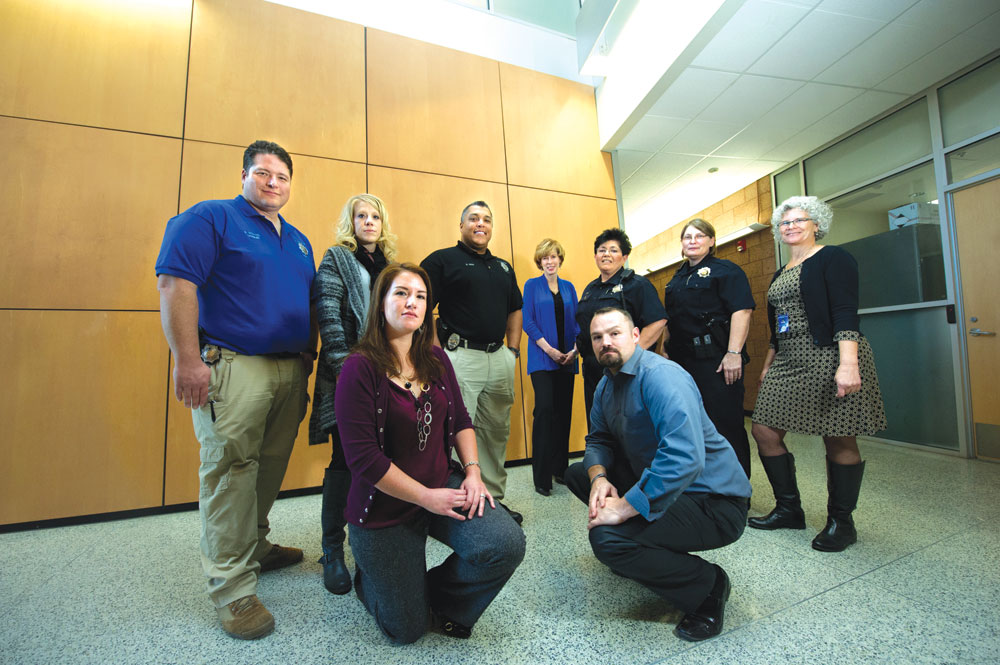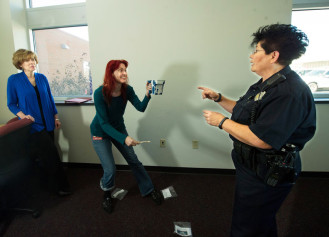
The Crisis Intervention Team from the Denver Police Department develops and implements programs to make sure officers are properly trained to handle a mental health crisis. Back left to right: Michael Vogler, Jaime Brower, Glenn West, Robin Eskey, Michele Guzman, Susan Gann, Sarah Chaikin; front left to right Sara Garrido and Shawn Knadler. Front Porch photos by Laura Mahony
A man is having a crisis and calls 911. The police arrive at his home and ask what the situation is. The problem is he is living in an altered reality where voices in his head tell him not to listen. He screams at the police. They notice he is muttering to himself and begin to understand he may have a mental illness. The voices tell him the police are a threat so he grabs a knife from the kitchen. Feeling at risk, the police command he put down the knife, but he still doesn’t listen. They have limited time to figure out how best to communicate. They tell him he must be feeling scared and alone. Suddenly like magic, he snaps back from the mental abyss and listens for the first time. They ask him more about how he feels and he begins to explain. Eventually he calms down and the voices subside, allowing him to put down the knife.
These types of situations happen every day. Police play dual roles as social workers and law enforcers. The Denver Police Department (DPD) is at the forefront of equipping its officers with the skills to deescalate a mental health crisis through a program called Crisis Intervention Training (CIT).
“Since the day officers put on their badges, they’ve been dealing with mental crises. That’s part of being an officer. We’re identifying those skills of seasoned officers, labeling them, and packaging it up to teach younger officers,” says Susan Gann, technician for the DPD Victim Assistance Unit. She’s also a part of the Denver Assessment Response Team, which pairs an officer with a social worker to respond to mental health crises.
Gann has been a part of CIT since its inception in 2002. Twenty officers volunteered for the training. In 2004, the program became a requirement, but it ended shortly after due to lack of funding. Unfortunately, good training is expensive.

During a role play with a professional actor, DPD officer Michele Guzman (right) demonstrates how to deescalate a potentially dangerous situation involving marijuana edibles while social worker Robin Eskey (left) advises how to communicate. “High-fidelity” role plays, which are based on real experiences, prepare officers for mental health or drug and alcohol crises.
When Robert White became DPD Chief of Police in 2011, he brought a new philosophy with him—preventing crime through citizen-police relationships. He wants the community to trust and know the police care about them. One part of that philosophy is making sure police can effectively relate and communicate with a person in a mental crisis.
White’s mission gained momentum after the 2012 Aurora movie theater shootings. He restructured the department and beginning in June, required every officer to be CIT-certified.
CIT is a 45-hour weeklong course including an overview of mental illness, lectures from experts, law policies and procedures, and presentations by people living with mental illnesses. Officers watch videos of parents of children with a mental illness and how they deal with situations, sometimes requiring physical restraint. One mom puts pillows on the ground and lies on top of her autistic son to calm him during a violent episode. One dad puts his son in a hammock that relaxes him during a delusional frenzy.
Officers go through high-fidelity role-plays with professional actors and get advice from CIT trainers and social workers on scene. An officer has four choices for intervention: talk, touch, talk with touch, or touch with talk.
An officer has to calmly figure out—usually with limited time—which intervention works best. They learn to recognize a type of mental illness, drugs and alcohol, or delirium, and know how to effectively defuse what could be a volatile situation. Most of the time, empathy
is key.
“Humans don’t like to have somebody tell them how to feel,” says Dr. John Nicoletti, who specializes in police and public safety psychology. He has been a big part of forming CIT. “Even though a person with a mental illness is decoding information incorrectly, the feelings are the same so empathy is like magic. As soon as you can get that connection, they think ‘This person understands me,’ and they’re going to be a lot more receptive.”
Some words trigger negative reactions. “Oh” is usually associated with “Oh sh–,” or “Oh my god,” and typically cause stress in a crisis. Part of the training focuses on the officer and how to stay calm.
By the end of CIT, officers gain 8–10 years of knowledge and experience, according to Gann. She wishes the training had existed when she was a young cop.
Over 20 years ago, Gann went on call with another officer to a woman’s apartment. The woman cowered in terror from demons stretching their arms out of the walls. As long as the arms kept reaching for her, nothing could calm her down. “At the time we didn’t know what to do; we just knew something’s not right,” Gann says. Without training or experience up to that point with a mental health crisis, the officers needed a quick solution.
The other officer made up a word, which Gann can’t recall now, that would stop the demons. “Do you have any of this?” the cop asked the woman. She shook her head. “Well, let me think what that might be in. I think it might be in Scotch tape.” The woman eagerly listened. “Do you have any?” She excitedly scurried to grab tape, which the officer used to put a big X on the wall at the points she saw the arms. By the end, she was less frantic but still didn’t feel safe. The officers left.
Gann still thinks back to that incident. “I’m sure after we left she was putting rolls of Scotch tape everywhere or was frustrated the police didn’t understand and didn’t want to call the police again. She was probably terrified.”
Gann believes with CIT training she would’ve handled the situation differently and made sure the woman got the help she needed.
DPD officers who have completed CIT report back the training helped in dealing with mental health incidents. Chief White hopes to have 100 percent of officers CIT trained. Only one 2013 Denver Police critical incident with mental illness or suspected mental illness involved no CIT-trained officers, according to a Sept. 10 letter White wrote to the Citizen Oversight Board.
DPD is currently working on a second level of CIT training. “We are stepping up the game,” Gann says. “It goes from boots on the ground all the way to the top of the chain … we want every officer to have real-life experience to relate the information they learn in CIT to work in the street.”




0 Comments